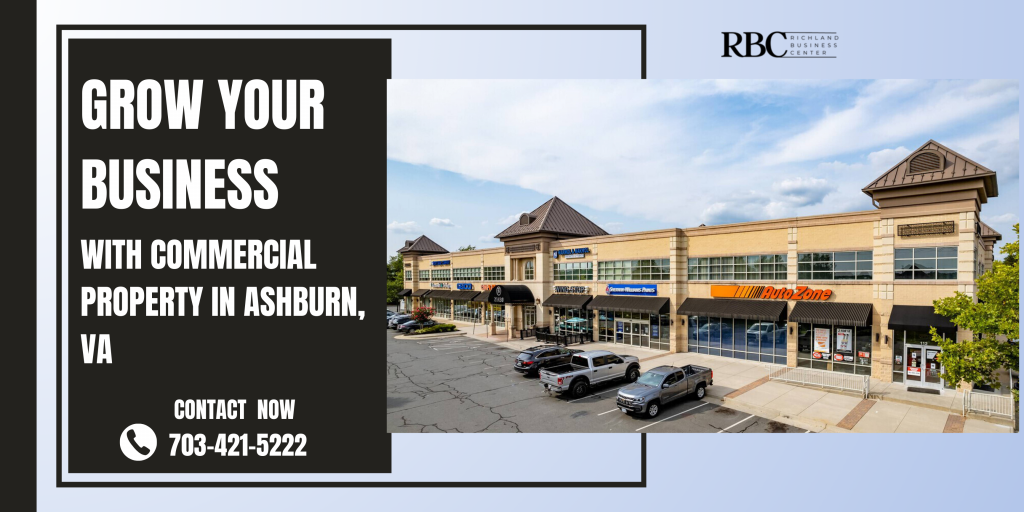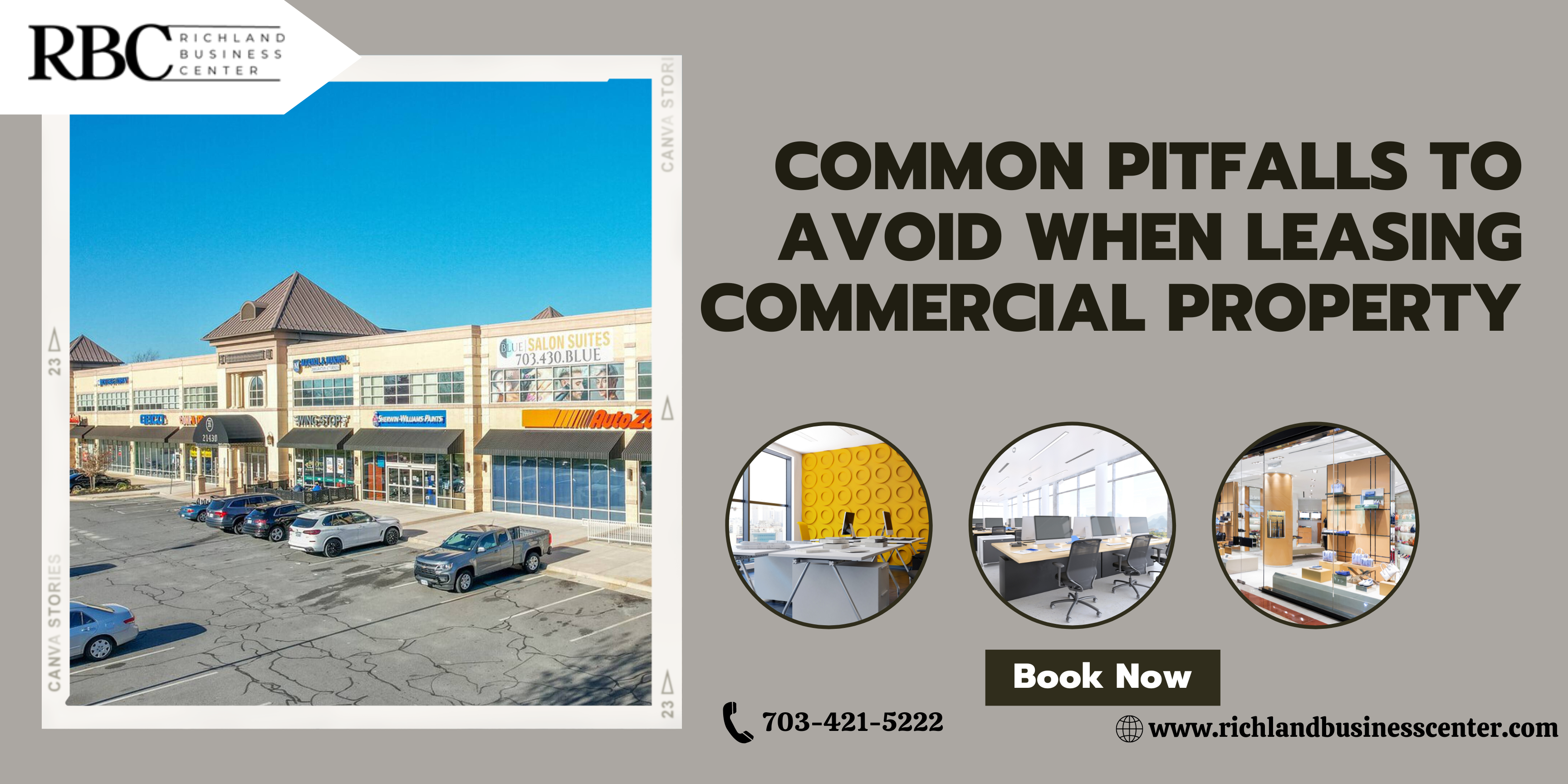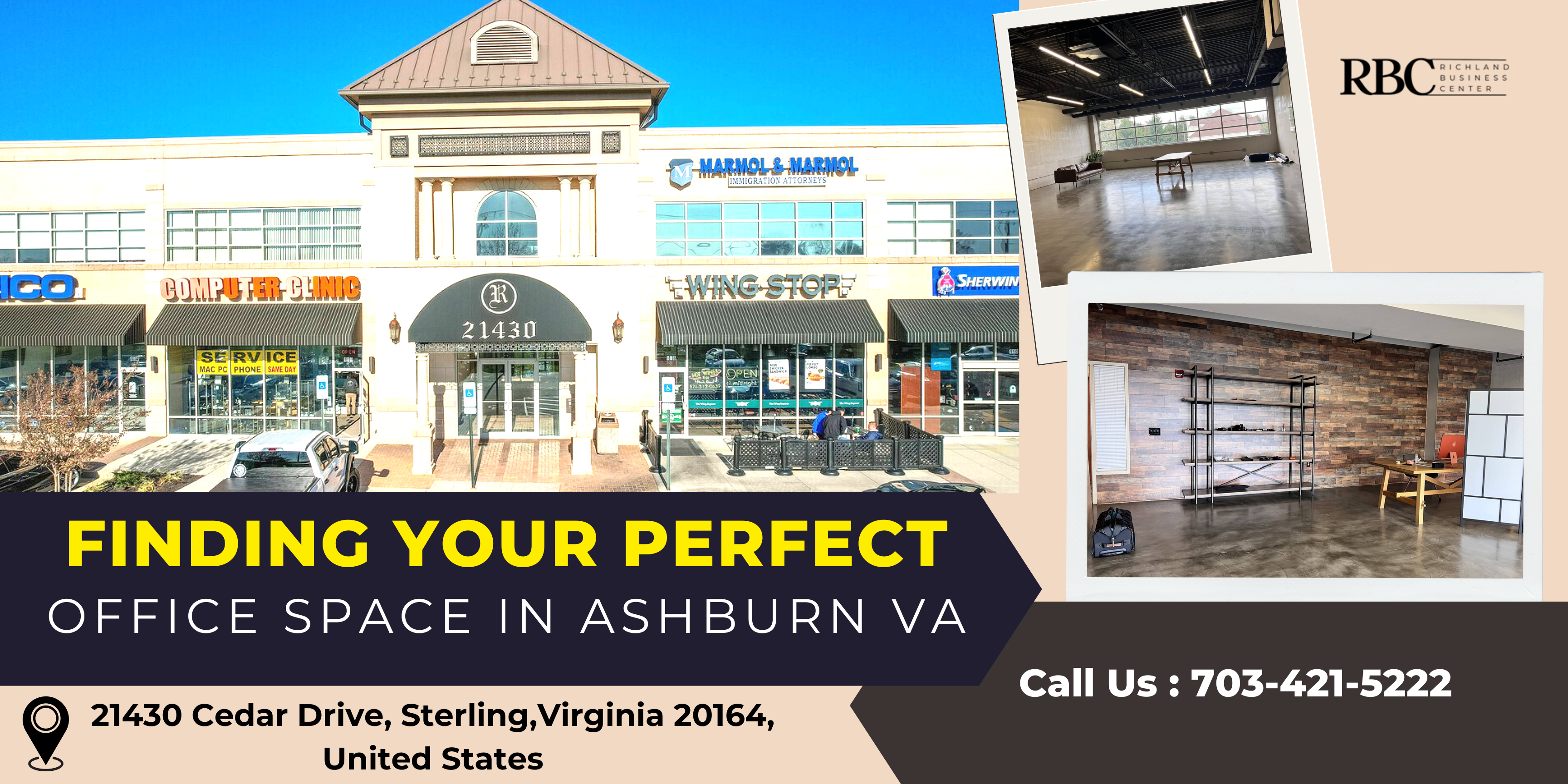Things to Consider Before Choosing an Office Suite for Rent in Sterling, VA

In the fast-paced business landscape of Sterling, VA, the quest for the perfect office space becomes a strategic imperative. Your journey to success starts with a pivotal decision: choosing the right office suite for rent in Sterling, VA. This metropolitan hub, nestled in the heart of Virginia, demands careful consideration when it comes to securing a workspace that aligns with your business goals.
Introduction
A. Brief Overview of Office Suites:
As you embark on this crucial decision-making journey, it’s essential to understand the dynamic nature of office suites for rent in Sterling, VA. These spaces go beyond mere four walls; they represent the beating heart of your business operations. Sterling, with its bustling economic activity and vibrant community, offers a diverse range of office suites tailored to various business needs.
B. Importance of Choosing the Right Office Space:
The significance of selecting the ideal office space in Sterling cannot be overstated. It transcends the physical realm, influencing your brand identity and shaping the perception of clients and employees alike. An office suite is not just a place to work; it’s a reflection of your corporate ethos and a catalyst for professional success.
As we navigate through the intricacies of choosing an office suite in Sterling, VA, let’s delve into the specific considerations that will ensure your workspace becomes a strategic asset in propelling your business forward. From location advantages to the nuances of lease agreements, we’ll guide you through a comprehensive exploration of factors crucial for making an informed decision in this dynamic business environment.
Location Matters
A. Proximity to Business Hubs
The significance of your office’s proximity to key business hubs cannot be overstated. Choosing a location near thriving business centers and commercial districts opens the door to numerous opportunities for collaboration, networking, and growth. Being close to other businesses fosters an environment of innovation and shared resources, facilitating partnerships that can elevate your company to new heights. Additionally, it enhances your visibility within your industry, making it easier for potential clients, partners, and investors to find and engage with your business.
B. Accessibility and Transportation Options
Easy accessibility and diverse transportation options contribute to the overall convenience of your office location. Consider the daily commute for both your employees and clients. An easily accessible location, whether by public transportation or major roadways, not only makes life simpler for your team but also ensures that clients can reach you without undue hassle. This factor is particularly crucial for businesses that rely on client meetings or frequently host events. Furthermore, a well-connected location reflects positively on your brand, showcasing a commitment to accessibility and convenience.
Budgetary Considerations
A. Upfront Costs: In the realm of securing the perfect office suite, it’s imperative to meticulously examine the upfront costs associated with the lease. Beyond the apparent rental fees, these initial expenses may include security deposits, setup fees, and any other charges not explicitly stated in the advertised price. Understanding and budgeting for these upfront costs is vital to prevent financial strains and unexpected surprises down the line.
B. Monthly Rental Expenses: The monthly rental expense is the heartbeat of your budgetary considerations. While it may seem straightforward, it’s crucial to assess whether the rental cost aligns harmoniously with your financial objectives. This involves not just the current state of your finances but also forecasting future growth and potential fluctuations. A well-aligned rental expense ensures a sustainable and healthy financial outlook for your business.
C. Hidden Costs and Fees: Lease agreements, often laden with legal jargon, may hide additional costs and fees that can catch tenants off guard. To navigate this potential financial minefield, a thorough examination of the lease agreement is necessary. Look out for clauses related to maintenance fees, utilities, or any other ancillary costs that might not be apparent at first glance. Understanding and negotiating these hidden costs will contribute to a more transparent and predictable financial arrangement.
Pro Tip: Engaging with the property management or a legal professional during the negotiation phase can help unearth these hidden costs, providing a clearer picture of the overall financial commitment associated with the office suite.
Budgetary considerations extend beyond the immediate costs to ensure your business’s financial health and stability throughout the lease term. By delving into the details of upfront costs, monthly expenses, and potential hidden fees, you’re better equipped to make informed decisions that align with your financial objectives. Remember, a well-managed budget in the beginning can pave the way for long-term success in your chosen office suite.
Space Requirements
A. Assessing Your Business Needs
When considering an office suite for rent in Sterling, VA, a critical starting point is a thorough assessment of your business’s spatial requirements. This involves not only understanding your current team size but also projecting future growth. Ask yourself:
1. Current Team Size: Evaluate the number of employees who will be utilizing the space daily. Ensure that there are enough workstations and common areas to accommodate everyone comfortably.
2. Nature of Work: Consider the nature of your business operations. Do you require dedicated offices for private meetings, collaborative spaces for team discussions, or a combination of both? Tailor the office layout to suit your specific needs.
3. Storage Needs: Factor in storage requirements for files, equipment, and personal belongings. Adequate storage contributes to an organized and clutter-free workspace.
4. Specialized Areas: If your business requires specialized areas such as a reception or a dedicated server room, ensure that the chosen office suite can accommodate these unique needs.
5. Common Areas: Evaluate the need for common areas like kitchenettes, break rooms, or recreational spaces. These areas contribute to employee well-being and foster a positive work environment.
B. Future Expansion Considerations
Beyond your current needs, it’s essential to think about the future. The office suite you choose should facilitate your business’s growth without requiring frequent relocations. Consider the following:
1. Scalability: Does the office space provide options for scalability? Ensure that it can easily adapt to accommodate a growing team without disrupting the workflow.
2. Flexibility in Layout: Look for office spaces with a flexible layout that can be easily reconfigured to meet changing needs. This ensures that the space can evolve alongside your business.
3. Room for Additional Staff: Plan for potential staff additions. Having a bit of extra space can be beneficial, preventing the need for immediate relocation when hiring new team members.
4. Future Equipment Needs: Anticipate future technological advancements and the potential need for additional equipment. Ensure that the office space can accommodate new technologies without constraints.
5. Contractual Flexibility: Check the lease agreement for flexibility in adjusting the space as your business grows. Terms that allow for easy expansion within the same building can save both time and resources.
Choosing an office suite that aligns with both your current and future space requirements is a strategic investment in the long-term success of your business. By thoroughly assessing your needs and planning for growth, you set the foundation for a workspace that enhances productivity and accommodates the evolving dynamics of your company.
Lease Terms and Flexibility
A. Duration of Lease Agreement
Choosing the right duration for your lease agreement is a critical aspect that directly impacts your business’s flexibility and financial stability. Consider the following factors:
1. Short-Term vs. Long-Term Leases:
(A) Short-Term Leases: Opting for a shorter lease may provide flexibility, allowing your business to adapt quickly to changing circumstances. However, they might come with higher monthly costs.
(B)Long-Term Leases: Long-term leases often offer cost savings but can limit your ability to respond to market changes. Assess your business’s growth trajectory and stability to determine the ideal lease duration.
2. Lease Renewal Options:
- Check for renewal options in the lease agreement. Having the flexibility to extend your lease can be advantageous if your business is thriving and requires continuity.
B. Options for Scaling Up or Down
The ability to scale your office space based on your business’s evolving needs is crucial for long-term success. Evaluate the following considerations:
1. Expansion Options:
- Explore if the office space allows for easy expansion within the same building or complex. This ensures your office can accommodate a growing team without the hassle of relocating.
2. Contraction Flexibility:
- In contrast, having the flexibility to downsize if needed is equally important. Business landscapes can change, and having options to reduce space without severe penalties provides financial security.
3. Subleasing Opportunities:
- Investigate whether the lease permits subleasing. This can be advantageous if you need to temporarily sublet space during periods of reduced workforce or if your business operates on project-based cycles.
4. Negotiation for Flexibility:
- Don’t hesitate to negotiate flexibility clauses directly into the lease agreement. Discuss terms that allow for adjustments in space, whether scaling up due to growth or scaling down during challenging periods.
5. Exit Strategies:
- Familiarize yourself with the exit strategies outlined in the lease agreement. Understand the conditions under which you can terminate the lease early, ensuring you have contingency plans for unforeseen circumstances.
Understanding the nuances of lease terms and flexibility is akin to future-proofing your business. It’s a strategic investment that balances the present needs of your company with the uncertainties and opportunities that the future may hold. By carefully considering these aspects, you position your business to adapt and thrive in the ever-changing business landscape of Sterling, VA.
Amenities and Facilities
A. Internet Connectivity In the digital age, seamless internet connectivity is non-negotiable. Evaluate the speed, reliability, and capacity of the internet service provided by the office space. A robust internet connection is vital for smooth communication, efficient operations, and staying connected with clients and partners.
B. Meeting Rooms and Conference Facilities Beyond individual workspaces, assess the availability and quality of meeting rooms and conference facilities. These spaces are crucial for client presentations, team collaborations, and hosting business meetings. A well-equipped meeting room can enhance your professional image and contribute to successful business interactions.
C. Parking Availability Consider the convenience of parking facilities for both clients and employees. A lack of parking space or inconvenient parking arrangements can create unnecessary hassles and impact the overall experience of those interacting with your business. Sufficient and easily accessible parking contributes to a positive first impression.
The “Amenities and Facilities” section emphasizes that the modern office extends beyond mere physical space. It encapsulates the digital infrastructure, spaces for collaborative endeavors, and the practicality of day-to-day operations. Each subheading addresses a critical aspect that, when carefully considered, ensures the chosen office space aligns with the functional needs and professional standards of a contemporary business.
In the ever-evolving landscape of modern business, a robust and reliable technology infrastructure is paramount to the success and efficiency of any enterprise. When considering an office suite for rent in Sterling, VA, evaluating the technology infrastructure is not merely a box to check; it’s a critical aspect that can either propel your operations forward or introduce unnecessary hurdles. Let’s delve deeper into the key considerations under this category:
A. IT Support and Infrastructure
1. Technical Support Accessibility: Ensure that the office space provides readily accessible IT support. Whether it’s troubleshooting technical glitches or setting up new equipment, having prompt assistance can prevent downtime.
2. Network Reliability: Assess the reliability of the internet and network connections. A stable and high-speed internet connection is vital for seamless communication, file sharing, and overall productivity.
3. Cybersecurity Measures: Inquire about the cybersecurity measures in place. Protection against cyber threats and data breaches is non-negotiable, especially when dealing with sensitive business information.
4. Redundancy Planning: Explore redundancy plans for power and internet outages. Having backup systems ensures that your operations continue uninterrupted even in the face of unforeseen challenges.
B. Compatibility with Your Business Technology
1. Integration Capabilities: Check if the existing technology infrastructure aligns with your business’s tech stack. Seamless integration of your systems with the office environment promotes efficiency and reduces potential headaches.
2. Future-Readiness: Assess the adaptability of the office space to future technological advancements. A forward-thinking infrastructure can accommodate evolving technology needs without major disruptions.
3. Power and Connectivity Outlets: Evaluate the availability and accessibility of power outlets and data ports. The spatial arrangement of these elements can impact the placement of workstations and the overall flexibility of your office setup.
4. Tech-Friendly Meeting Spaces: Ensure that meeting rooms are equipped with the necessary technology for presentations and collaborative sessions. This includes audiovisual equipment, video conferencing capabilities, and reliable connectivity.
Considering these aspects of technology infrastructure is not just about having the latest gadgets; it’s about creating an environment where technology seamlessly supports and enhances your business operations. A well-thought-out tech infrastructure contributes to increased productivity, improved collaboration, and a future-ready workspace that can adapt to the ever-changing demands of the business world. When choosing an office suite in Sterling, VA, make sure that the technology backbone aligns with your business goals and sets the stage for success.
Conclusion
As we wrap up this comprehensive guide on things to consider before choosing office suites for rent in Sterling, VA, it becomes clear that the decision-making process is multifaceted and requires meticulous attention to detail. From the strategic importance of location to the intricacies of lease agreements, each aspect plays a pivotal role in shaping the success of your business venture. By emphasizing the significance of thorough research and understanding, we’ve equipped you with the tools to make informed choices. Sterling, VA, offers a vibrant business landscape, and selecting the right office space is an investment in your company’s future. Remember, the ideal office suite goes beyond providing a physical space; it becomes a catalyst for productivity, collaboration, and growth. May your journey in choosing the perfect office suite in Sterling, VA, be guided by these considerations, ensuring that your workspace aligns seamlessly with your business goals and aspirations.
Frequently Asked Questions
Q1: What factors should I consider when choosing an office suite in Sterling, VA?
A1: When selecting an office suite for rent in Sterling, VA, consider crucial factors such as location, budget, space requirements, lease terms, and technology infrastructure. These elements collectively shape the success of your business in this vibrant business hub.
Q2: Why is the technology infrastructure important for an office space in Sterling, VA?
A2: The technology infrastructure in Sterling, VA’s office suites is crucial for seamless operations. It includes IT support, reliable internet, cybersecurity measures, and compatibility with your business technology. A well-established tech backbone ensures your business stays connected and secure.
Q3: How can I ensure future growth potential when choosing an office space?
A3: Assess the surrounding business landscape and economic development trends in Sterling, VA. Look for office suites that not only meet your current needs but also have the potential to accommodate your business growth in the future.

 Previous Post
Previous Post


